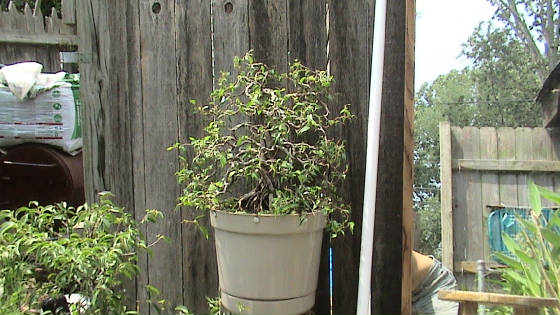Virtually
everyone wants a bonsai, yet only a small percentage of those of you who do have the will to actually keep one trimmed.
One must do this periodically in order that a bonsai continues to look like a bonsai. In essence a bonsai is much like a lawn;
it needs sporadic “sculpting” for the desired look or it will essentially revert back to looking like a bush over
time. If you plant it in the ground in the correct climate it will become a full-grown tree. Remember this before purchasing
one. Unless you are willing to spend the time, you’re not going to have an ascetically pleasing bonsai.

|
| This photo links to what I consider the best Bonsai website on the web |
I myself get somewhat busy and don’t always
have the time to trim every one of my bonsais. So many of them do end up looking like bushes. There’s nothing wrong
with this, they simply don’t become masterpieces as quickly as they would if I gave them the time they deserve. When
I have the time, and the will, I trim them back and they look great.
Next up, what species make good bonsais? A bonsai
can be practically any plant that grows bark, … essentially any tree. Some species make excellent bonsais, usually those
with small leaves, while there are others who are not suited well for being trained as a bonsai. Steel magnolias and avocados
with their extremely large leaves come to mind as species I have tried who are not exactly great candidates. So in essence
a bonsai is most often a tree that would become quit large if given plenty of nutrients and the right growing conditions,
but has been sculpted and trimmed to look like a far smaller one for artistic purposes.
Ficus: without any doubt the
best species I have found for creating bonsais. By and large the bonsais I offer are Ficus for several reasons. The first
is that Ficus are exceptionally hardy. The reason they are most often seen as houseplants is simply because they can live
in dim or strong light, and can go long periods of time without water. In the wild, most species of Ficus grow in dense forests.
So when they hit the ground as seeds, they don’t have access to much light, hence they can live as houseplants in dim
light. As they become larger they have access to more and more light and love it. There are also only two seasons, the wet
and the dry. Therefore in the “winter” up here in the states, it’s somewhat important that you don’t
over water them in their dormant season. This is why many of their leaves turn yellow and fall off.

In any event, these Black Hills spruce I am offering
are not as forgiving. They come from North America’s equivalent of Siberia. They cannot withstand the hotter summers
of some areas. Remember this when purchasing. Anyone who lives in the deep south can forget about these. Your summers will
not be appreciated by these conifers.
Being a conifer, a gymnosperm,
they also prefer slightly acidic soil. When fertilizing one must use fertilizer specifically designed for conifers or azaleas.
As for watering, I use distilled or collected rainwater. I have not watered any of these spruce with tap water and don’t
want to find out what will happen if I did. I also spray the foliage, since conifers leaves absorb water just as well as their
roots. Virtually all conifers love having their needles sprayed.
I have
left these bonsais in larger pots for various reasons. First of all, when I began creating bonsais over twenty years ago,
I would repot them in the traditional bonsai pots. This was fine until the first day that came along and I was too busy to
water them. Well, I lost many a bonsai in smaller pots, or had them wither back substantially. So these days I always keep
my bonsais in larger containers and have them sit in standing water during the summer.
The second
reason is these nursery pots they come in are very easy to shape conifers with if I simply press thumbtacks into the side
and pull the branches down to shape. I’ll be able to sell them at a lower price as well.
So, …
if I haven’t scared you away from purchasing one of these bonsais, I hope you realize that you are in essence purchasing
a “pet” that needs care each and every day. With these spruce that would essentially involve spraying their foliage
several times a day, especially during the hotter days of the year. If you are interested in purchasing any, please email
me at SymbioticTerrariums@hotmail.com.
I prefer
customers who live within ~ an hour or so of St. Louis, since I would rather drive it to you than ship it. Still don’t
trust FedEx, UPS or the USPS when it comes to bonsais. If you live close to St. Louis, you won’t have to pay as much
for shipping, since I will probably only charge a few bucks for gas. My car gets 38 mph so it’s not that big of a deal.
Will
|
